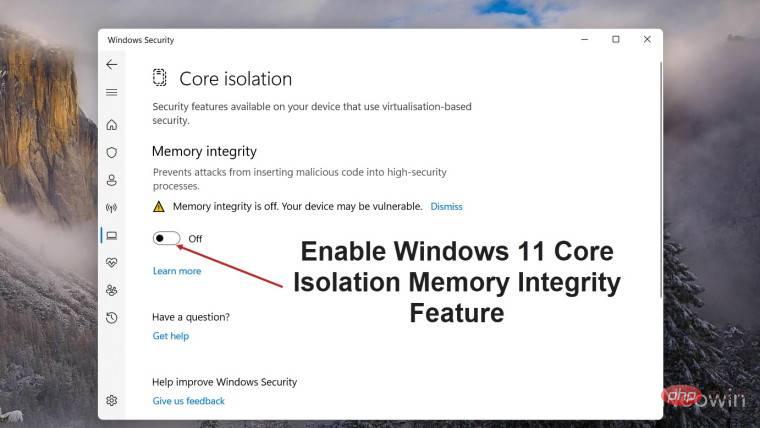This article mainly introduces the Asp.Net Core lightweight Aop solution: AspectCore. Friends who need it can refer to it
What is AspectCore Project?
AspectCore Project is a lightweight Aop (Aspect-oriented programming) solution suitable for the Asp.Net Core platform. It better follows the modular development concept of Asp.Net Core. Using AspectCore can be more Easily build low-coupling, easily scalable web applications. AspectCore uses Emit to implement efficient dynamic proxy without relying on any third-party Aop library.
Start using AspectCore
Start Visual Studio. From the File menu, choose New > Project. Select the ASP.NET Core Web Application project template and create a new ASP.NET Core Web Application project.
Install AspectCore.Extensions.DependencyInjection package from Nuget:
- ##PM> Install-Package AspectCore.Extensions.DependencyInjection
- In general, you can use the abstract InterceptorAttribute custom attribute class, which implements the IInterceptor
public class CustomInterceptorAttribute : InterceptorAttribute
{
public async override Task Invoke(IAspectContext context, AspectDelegate next)
{
try
{
Console.WriteLine("Before service call");
await next(context);
}
catch (Exception)
{
Console.WriteLine("Service threw an exception!");
throw;
}
finally
{
Console.WriteLine("After service call");
}
}
}Define the ICustomService interface and its implementation class CustomService: public interface ICustomService
{
[CustomInterceptor]
void Call();
}
public class CustomService : ICustomService
{
public void Call()
{
Console.WriteLine("service calling...");
}
}Inject ICustomService in HomeController:
public class HomeController : Controller
{
private readonly ICustomService _service;
public HomeController(ICustomService service)
{
_service = service;
}
public IActionResult Index()
{
_service.Call();
return View();
}
}Register ICustomService, and then configure the container to create a proxy type in ConfigureServices:
public IServiceProvider ConfigureServices(IServiceCollection services)
{
services.AddTransient<ICustomService, CustomService>();
services.AddMvc();
services.AddAspectCore();
return services.BuildAspectCoreServiceProvider();
}Interceptor configuration. First install the AspectCore.Extensions.Configuration package:
PM> Install-Package AspectCore.Extensions.ConfigurationGlobal interceptor. Use the
overloaded method of AddAspectCore(Action
services.AddAspectCore(config =>
{
config.InterceptorFactories.AddTyped<CustomInterceptorAttribute>();
}); Global interceptor with constructor parameters, add a constructor with parameters in CustomInterceptorAttribute:
public class CustomInterceptorAttribute : InterceptorAttribute
{
private readonly string _name;
public CustomInterceptorAttribute(string name)
{
_name = name;
}
public async override Task Invoke(AspectContext context, AspectDelegate next)
{
try
{
Console.WriteLine("Before service call");
await next(context);
}
catch (Exception)
{
Console.WriteLine("Service threw an exception!");
throw;
}
finally
{
Console.WriteLine("After service call");
}
}
}Modify global interceptor registration:
services.AddAspectCore(config =>
{
config.InterceptorFactories.AddTyped<CustomInterceptorAttribute>(args: new object[] { "custom" });
});As a global interceptor for the service. Add in ConfigureServices:
services.AddTransient<CustomInterceptorAttribute>(provider => new CustomInterceptorAttribute("service"));Modify global interceptor registration:
services.AddAspectCore(config =>
{
config.InterceptorFactories.AddServiced<CustomInterceptorAttribute>();
});acts on a specific Service or Method Global interceptor, the following code demonstrates the global interceptor acting on classes with the Service suffix:
services.AddAspectCore(config =>
{
config.InterceptorFactories.AddTyped<CustomInterceptorAttribute>(method => method.DeclaringType.Name.EndsWith("Service"));
});Specific global interception using the wildcard character Device:
services.AddAspectCore(config =>
{
config.InterceptorFactories.AddTyped<CustomInterceptorAttribute>(PredicateFactory.ForService("*Service"));
}); Provide NonAspectAttribute in AspectCore to prevent Service or Method from being proxied:
[NonAspect]
public interface ICustomService
{
void Call();
}Supported at the same time The configuration is ignored globally and wildcards are also supported: services.AddAspectCore(config =>
{
//App1命名空间下的Service不会被代理
config.NonAspectOptions.AddNamespace("App1");
//最后一级为App1的命名空间下的Service不会被代理
config.NonAspectOptions.AddNamespace("*.App1");
//ICustomService接口不会被代理
config.NonAspectOptions.AddService("ICustomService");
//后缀为Service的接口和类不会被代理
config.NonAspectOptions.AddService("*Service");
//命名为Query的方法不会被代理
config.NonAspectOptions.AddMethod("Query");
//后缀为Query的方法不会被代理
config.NonAspectOptions.AddMethod("*Query");
});
Dependency Injection in the interceptor. Supports property injection, constructor injection and service locator patterns in interceptors. Property injection, property tags with public get and
set permissions in the interceptor [AspectCore.Abstractions.FromServices] (different from Microsoft.AspNetCore.Mvc. FromServices) feature, you can automatically inject this property, such as:
public class CustomInterceptorAttribute : InterceptorAttribute
{
[AspectCore.Abstractions.FromServices]
public ILogger<CustomInterceptorAttribute> Logger { get; set; }
public override Task Invoke(AspectContext context, AspectDelegate next)
{
Logger.LogInformation("call interceptor");
return next(context);
}
} Constructor injection needs to make the interceptor as a Service. In addition to the global interceptor, it can still be Use ServiceInterceptor to enable the interceptor to be activated from DI:
public interface ICustomService
{
[ServiceInterceptor(typeof(CustomInterceptorAttribute))]
void Call();
} Service Locator pattern. The interceptor context AspectContext can obtain the current Scoped ServiceProvider:
public class CustomInterceptorAttribute : InterceptorAttribute
{
public override Task Invoke(AspectContext context, AspectDelegate next)
{
var logger = context.ServiceProvider.GetService<ILogger<CustomInterceptorAttribute>>();
logger.LogInformation("call interceptor");
return next(context);
}
}Using Autofac and AspectCore. AspectCore natively supports integrating Autofac. We need to install the following two nuget packages:
PM> Install-Package Autofac.Extensions.DependencyInjection PM> Install-Package AspectCore.Extensions.AutofacAspectCore provides the RegisterAspectCore extension method to register the services required by the dynamic proxy in the Autofac Container and provide The AsInterfacesProxy and AsClassProxy extension methods enable proxies for interfaces and classes. Modify the ConfigureServices method to:
public IServiceProvider ConfigureServices(IServiceCollection services)
{
services.AddMvc();
var container = new ContainerBuilder();
container.RegisterAspectCore();
container.Populate(services);
container.RegisterType<CustomService>().As<ICustomService>().InstancePerDependency().AsInterfacesProxy();
return new AutofacServiceProvider(container.Build());
}The above is the detailed content of A brief discussion on AspectCore_Practical skills. For more information, please follow other related articles on the PHP Chinese website!
 如何在 Windows 11 中启用 Core Isolation 的内存完整性功能May 10, 2023 pm 11:49 PM
如何在 Windows 11 中启用 Core Isolation 的内存完整性功能May 10, 2023 pm 11:49 PMMicrosoft的Windows112022Update(22H2)默认启用CoreIsolation的内存完整性保护。但是,如果您运行的是旧版本的操作系统,例如Windows112022Update(22H1),则需要手动打开此功能。在Windows11中开启CoreIsolation的内存完整性功能对于不了解核心隔离的用户,这是一个安全过程,旨在通过将Windows上的基本核心活动隔离在内存中来保护它们免受恶意程序的侵害。该进程与内存完整性功能相结合,可确保
 电脑core是什么意思Sep 05, 2022 am 11:24 AM
电脑core是什么意思Sep 05, 2022 am 11:24 AM电脑中core有两种意思:1、核心,也即内核,是CPU最重要的组成部分,CPU所有的计算、接受存储命令、处理数据都由核心执行;2、酷睿,core是英特尔的处理器名称,酷睿是英特尔公司继奔腾处理器之后推出的处理器品牌,目前已经发布了十二代酷睿处理器。
![如何修复 Windows 11 / 10 中的处理器热跳闸错误 [修复]](https://img.php.cn/upload/article/000/000/164/168169038621890.png) 如何修复 Windows 11 / 10 中的处理器热跳闸错误 [修复]Apr 17, 2023 am 08:13 AM
如何修复 Windows 11 / 10 中的处理器热跳闸错误 [修复]Apr 17, 2023 am 08:13 AM大多数设备(例如笔记本电脑和台式机)长期被年轻游戏玩家和编码人员频繁使用。由于应用程序过载,系统有时会挂起。这使用户被迫关闭他们的系统。这主要发生在安装和玩重度游戏的玩家身上。当系统在强制关闭后尝试启动时,它会在黑屏上抛出一个错误,如下所示:以下是在此引导期间检测到的警告。这些可以在事件日志页面的设置中查看。警告:处理器热跳闸。按任意键继续。..当台式机或笔记本电脑的处理器温度超过其阈值温度时,总是会抛出这些类型的警告消息。下面列出了在Windows系统上发生这种情况的原因。许多繁重的应用程序在
 .NET Core跨平台应用开发实战:从Windows到Linux与macOS的无缝之旅Feb 26, 2024 pm 12:55 PM
.NET Core跨平台应用开发实战:从Windows到Linux与macOS的无缝之旅Feb 26, 2024 pm 12:55 PM随着.NETCore的推出,.NET开发者迎来了全新的机遇,可以在多个操作系统上轻松编写和运行.NET应用程序。本文将深入探讨如何利用.NETCore实现跨平台应用开发,并分享在Windows、Linux和macOS等操作系统上的最佳实践经验。一、准备开发环境要开始跨平台应用开发,首先需要为每个目标平台准备好开发环境。Windows在Windows上,你可以通过VisualStudio来安装.NETCoreSDK。安装完成后,你可以通过VisualStudio创建和运行.NETCore项目。Li
 CORE币值得长期持有吗?CORE币值得投资吗?Feb 29, 2024 pm 05:34 PM
CORE币值得长期持有吗?CORE币值得投资吗?Feb 29, 2024 pm 05:34 PMCORE币:值得长期持有吗?CORE币是一个基于工作量证明(PoW)共识机制的加密货币,由Core团队在2018年创立。其目标是建立一种安全、高效、可扩展的数字货币体系,被广泛应用于支付和价值储存。CORE币的设计旨在提供一种去中心化的支付解决方案,为用户提供更多的隐私保护和交易便利性。CORE币的优势安全:CORE币基于工作量证明共识机制,具有很强的安全性。高效:CORE币的交易速度快,每秒可处理数千笔交易。可扩展:CORE币的区块容量大,可支持大量交易。去中心化:CORE币是一个去中心化的加
 在linux下core是什么Mar 23, 2023 am 10:00 AM
在linux下core是什么Mar 23, 2023 am 10:00 AM在linux下core是一个内存映像,同时加上调试信息;在linux下遇到程序异常退出或者中止,我们都会使用core文件进行分析,其中包含了程序运行时的内存、寄存器、堆栈指针等信息,格式为ELF,可以理解是程序工作当前状态转储成一个文件。
 IFA 2024 | Core Ultra Series 2: In Lunar Lake, Intel introduces its most efficient x86 CPU yetSep 04, 2024 am 06:38 AM
IFA 2024 | Core Ultra Series 2: In Lunar Lake, Intel introduces its most efficient x86 CPU yetSep 04, 2024 am 06:38 AMRoughly one year after announcing the Core Ultra Series 1, also known as Meteor Lake, Intel follows up with the second generation. Core Ultra Series 2 aka Lunar Lake was already introduced at June's Computex. At IFA, the final launch of the Core Ultr
 Surface Laptop Studio 即将登陆欧洲,这就是它的价格May 10, 2023 pm 05:34 PM
Surface Laptop Studio 即将登陆欧洲,这就是它的价格May 10, 2023 pm 05:34 PM<ul><li><strong>点击进入:</strong>ChatGPT工具插件导航大全</li></ul>微软早在2021年9月就宣布推出配备最新英特尔处理器、NVIDIAGPU等的全新SurfaceLaptopStudio,但迄今为止该设备尚未在欧洲正式发行。已经泄露了该设备的最终到货日期,即2月22日,以及英国的定价。&a


Hot AI Tools

Undresser.AI Undress
AI-powered app for creating realistic nude photos

AI Clothes Remover
Online AI tool for removing clothes from photos.

Undress AI Tool
Undress images for free

Clothoff.io
AI clothes remover

AI Hentai Generator
Generate AI Hentai for free.

Hot Article

Hot Tools

SAP NetWeaver Server Adapter for Eclipse
Integrate Eclipse with SAP NetWeaver application server.

Dreamweaver Mac version
Visual web development tools

ZendStudio 13.5.1 Mac
Powerful PHP integrated development environment

Atom editor mac version download
The most popular open source editor

SublimeText3 Linux new version
SublimeText3 Linux latest version






